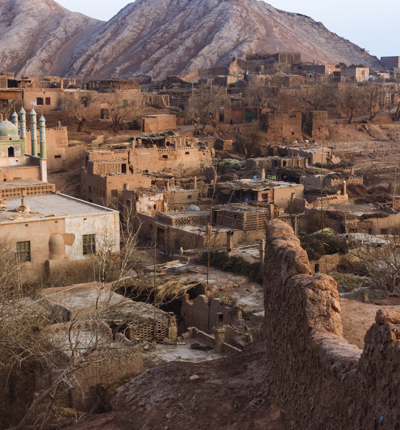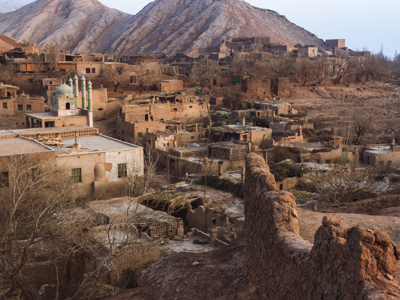
Research identifies probable links between Shein backed industrial park and Xinjiang textile manufacturing
Research investigating Shein’s supply chains has identified probable links between an industrial park backed by the fashion retailer and Xinjiang based cotton and textile manufacturers.
Posted on 29 April 2025
The industrial park, located in the Guangdong region of China, has very likely received investment and support from Shein, research commissioned by Stop Uyghur Genocide (SUG) has found.
The Guangqing Textile and Garment Industry Orderly Transfer Park was found by the research to have been designed to connect Xinjiang cotton and textile companies with e-commerce giants, including Shein.
Forced labour is strongly associated with the Xinjiang region of China, populated by the Uyghur people, to the extent that the United States government presumes that all goods manufactured in the region are made with forced labour.
Human rights lawyers at law firm Leigh Day, which represents the campaign group SUG, have sent the research to the Financial Conduct Authority (FCA) following media reports suggesting that Shein could be permitted to list on the London Stock Exchange (LSE).
SUG has previously provided a dossier of evidence to the FCA as part of its campaign to halt Shein’s progress towards LSE listing. The group says the evidence in the dossier shows a high likelihood of forced labour in the fashion retailer’s supply chains, which it argues is unlawful under the Modern Slavery Act.
As part of its investigation into Shein’s supply chains, SUG commissioned research from a supply chain consultant to further investigate Shein’s potential links to forced labour in the Xinjiang region of China.This came after a representative from Shein declined to answer questions put forward by a Parliamentary Committee in January 2025 about whether cotton from Xinjiang was present in the retailer’s supply chains.
The expert investigation and research identified a number of Shein industrial parks in China where manufacturing and logistical operations take place.One of these parks, the Guangqing Textile and Garment Industry Orderly Transfer Park, located in the city of Qingyuan in the Guangdong region of China, was found to have possible connections to textile production in Xinjiang.
The research found that representatives from the Guangdong government had signed a ‘cooperative agreement’ with the Xinjiang Development and Reform Commission at an event in August 2023, and that cotton and textile companies from Xinjiang also present at the event had signed intentions to ‘settle down’ in the Guangqing park.
The companies that signed the intentions included several companies that are banned from importing goods into the United States, as well as the Xinjiang Production and Construction Corps - a paramilitary corporate conglomerate that is linked to human rights abuses in Xinjiang and has been sanctioned by the UK government.
Attendees at the August 2023 event were informed that the Guangqing park would be developed to become an ‘industrial paradise’ for the clothing industry, and would create a ‘fast fashion smart manufacturing base’.
The event also saw the promotion of a business model that would see design and pattern making take place in Guangdong, production take place in Xinjiang, and sales take place back in Guangdong.
The research found that Shein had been present at the opening of the park in November 2023 and signed a ‘strategic cooperation agreement’ with it. This agreement involved the fashion retailer offering brand, technological and capital support to the park.
The research also found that Shein hosted an ‘investment promotion event’ at the park in March 2024, encouraging textile and clothing manufacturers to move to the premises with the potential benefit of becoming a supplier for Shein.
The research concludes that there is credible evidence to suggest that Shein has invested in and promoted the Guangqing park, which was deliberately designed to connect Xinjiang cotton and textile companies with large e-commerce companies such as Shein.
It also concludes that it is reasonable to believe that Shein would know what it was promoting and investing in, and that it is highly likely that clothes made or sold in the park would have been made of cotton and textiles from Xinjiang.
The research report suggests that, given the park is designed to both promote Xinjiang textiles and sell products made in the park on the Shein platform, there is a high risk that Shein products would be made of Xinjiang textiles.
Media reports have suggested that the FCA has approved Shein for listing on the LSE, but no approval appears on the FCA’s public register of approved prospectuses. SUG believes that if Shein has applied to list on the LSE, final approval must still be awaited. SUG believes the FCA must take the new report into account in considering any application.
Rahima Mahmut, executive director of Stop Uyghur Genocide, said:“As a Uyghur, I carry the pain of seeing countless Uyghur families torn apart by state-sponsored forced labour programmes. The research shows credible evidence that Shein has not only invested in but actively promoted a textile hub designed to connect global commerce with the Uyghur region — a region where atrocity crimes, including genocide and cultural destruction, are being carried out with industrial efficiency.“
By signing strategic agreements and encouraging production in this park, I believe Shein is not simply turning a blind eye — I believe it is profiting from a system built on the forced labour of persecuted people. Allowing such a company to list on the London Stock Exchange would stain the UK’s commitment to human rights and the rule of law. The Financial Conduct Authority must take this evidence seriously. We cannot let the City of London become a safe haven for companies whose supply chains are at risk of being connected with allegations of genocide.”
Harmit Kambo, campaigns manager at Good Law Project, said:
“Given the findings in this new report, it would make a mockery of the UK's Modern Slavery Act if this listing was approved. Previously, the Business Secretary, Jonathan Reynolds said that if Shein was to list on the London Stock Exchange, it would be expected to meet 'ethical and moral targets'. It would demean UK PLC if the FCA were to now waive through a company that reportedly trashes the environment, has been accused of dodging taxes, and appears to be linked to the forced labour of Uyghur people.”
Leigh Day partner Ricardo Gama, who represents SUG, said:
“An independent report commissioned by our client has found worrying links between a Shein-supported industrial park and textile manufacturing companies in the Xinjiang region. Our client believes that the report shows how important it is that Shein is not allowed to raise capital on the London market. We have provided the report to the FCA.”

Ricardo Gama
Ricardo specialises in judicial review claims, in particular on environmental issues.

Stop Uyghur Genocide serves Shein spokesperson with dossier alleging supply chain abuses before they give evidence to Parliamentary Committee
Lawyers acting for Stop Uyghur Genocide (SUG) have provided Shein’s in house lawyer with a dossier of evidence alleging supply chain abuses ahead of the company’s appearance before the Business and Trade Select Committee on Tuesday 7 January.

Stop Uyghur Genocide welcomes Parliamentary Committee’s interrogation of Shein supply chains
Stop Uyghur Genocide (SUG) has welcomed the Business and Trade Committee’s robust interrogation of a Shein legal representative over the fashion company’s supply chains.

Stop Uyghur Genocide threatens court challenge to Financial Conduct Authority over Shein bid to list on London Stock Exchange
Stop Uyghur Genocide (SUG) has stepped up its fight against Shein’s application to list on the London Stock Exchange with a threat to issue a High Court challenge to the Financial Conduct Authority (FCA).

